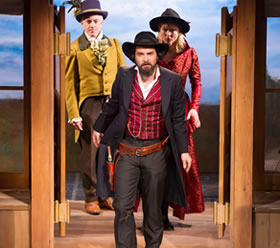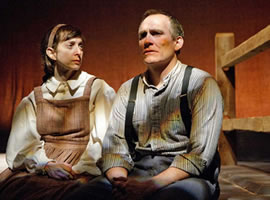|
JACQUELINE LAWTON: Why did you decide to get into theatre? Was there someone or a particular show that inspired you?
SUSAN GALBRAITH: I have been doing theatre since as young as I remember. As a child I danced and did theatre everywhere my father and mother were stationed at embassies. So in Indonesia Is studied Balinese and Javanese dance, in London I took ballet and theatre lessons and performed in professional theatre. And I always loved going to theatre as much as being in theatre – saw great theatre in London, Paris, New York, Minneapolis, Boston – all the cities I’ve lived in. In 1972 I spent a year in London in a special program that included an independent study that I did with various critics writing for London papers. I worked for Robert Brustein, who was also writing about theatre in London that year, but also met and spoke with many of the London critics – people like Michale Billington and John Elsom. I found them such an articulate and friendly group, and the level of criticism there was not only high but more collective, eclectic and generous. I learned that theatre criticism served more as a dialogue than what we have in America’s major cities too often with the danger of a single voice having the power to kill a show. I learned a lot. JL: How long have you lived and worked as a theatre critic in D.C.? What brought you here? Why have you stayed? SG: I came to DC in 1991 in order to have a child and live closer to my mother who by that time was living alone after my father died. I was able to work a little at Woolly Mammoth and Signature Theatre, but then divorced and finding myself a single mother needed to have steady work, health insurance and such. It is only recently I have returned to the theatre. I did not imagine when I moved here frankly that I would find the breadth of theatre nor the talent. It has only grown, and the cultural life with its many international voices, cuisine, etc. has enriched this city enormously. JL: How do you define the work you do? Specifically, what is the role of the theatre critic in the world of theatre? What contribution do you hope to make in the D.C. Theatre community and the American Theatre? SG: I hate that there are still critics in various cities across the country who still dominate their community’s rating of theatre productions. It’s not healthy. There have also been critics for a long time who are more interested in being clever than trying to get inside a performance. Some critics seem to hate theatre. I think the best critics try to describe the experience of what they saw and heard in front of them. I also like critics who try to “taste” the context of that theatre’s audience. It may not be a show to my taste – let’s give an example – “Wicked” for instance. (I fear I may get trampled by teenagers on this one.) But I have to say I could feel the generations around me when I saw it at the Kennedy Center for whom it clearly was their defining musical. I like a lot of different theatre and styles of theatre. I guess my contribution would be something along the lines of encouraging people to stretch out of their comfort zone, both culturally and stylistically in terms of new work. I also would like to make people who don’t see a lot of theatre get better about going out and more critically astute about what they’re seeing. Just because someone is in a TV reality show doesn’t mean they can act, and acting on stage takes vocal chops and the ability to memorize, build and and sustain a role night after night. I see writing about theatres is one of the ways I can contribute to theatre. Right now I am writing on one project and directing another – both works that would not have got done most likely. But just because I have been around a long time, I do think I have a voice that can engage in a dialogue with other reviewers in seeing and noting good reasons to see theatre. JL: If your work as a theatre critic doesn’t pay the bills, what else do you do? How do you balance this work with your play viewing and criticism? SG: In writing reviews for DC Theatre Scene, which has quite a stable of writers, we get spread out so no one gets overburdened with assignments. The good news is that none of us get tired or cranky about going to theatre – it is still pretty exciting – and we stay fresh, I think. The bad news is no one can really make a living with such a schedule. I think I am very lucky because I like engaging in theatre and writing in a lot of different ways. I always have made my own work alongside assignments or roles I have been given. My work as a director and playwright and my background as a performer gives me eyes and ears to appreciate theatre and view a performance critically from several vantages. I also still work as an educational consultant that was my livelihood through my position with the Great Books Foundation for many years. I happen to love working with teachers, supporting them to ask higher order questions and engage in critical thinking with their students. I have also found a bonus in that the work allows me to nudge teachers to integrate more arts in their lessons. I’ve been lucky that I have work where I’m always learning and it feels useful. JL: What skills and traits do you feel a successful theatre critic should have when writing about theatre, especially when it comes to new plays? SG: I don’t know about “shoulds”… I think you have to love theatre and quite honestly I think my particular approach to writing reviews is informed by my many years practicing theatre as a performer and director. When I sit in the darkness of a theatre, I am trying to get inside the mind of the vision a director is going for or the choices an actor makes on stage. I can appreciate the risks or when something is borrowed (cleverly or not!) My jack-of-all-trades helps because I know something about voice production, something about dance (classical and contemporary), and something about acting styles because I studied so many forms including classical acting in London, dance-theatre in Asia, and what we’ll call American realism in New York with people like Stella Adler, Gene Frankel and so on. It’s also about living a life of seeing everything you can and seeing the best. The last is important, and I have been so very lucky to have seen some of the greatest performers. Dancers like Rudolf Nureyev and Margot Fonteyn, Barishnikov and Gelsey Kirkland. Great actors like Lawrence Olivier, Jason Robards, Irene Worth, Colleen Dewhurst, Daniel Day Lewis; and great companies like Théatre du Soleil, Lyubimov’s Na Taganke Theatre, Peter Brook’s company, the golden age of repertory companies at The Guthrie in Minneapolis and Arena Stage right here in D.C. These performances have set a very high bar and have provided me with an incredible foundation and storage of knowledge. JL: What is your writing and viewing process? Do you read the script prior to seeing a production? Do you research the author and/or world of the play? Do you read the program notes? SG: If I can of course I read the script. Even if I think I know the play, I go back and reread it. Recently I attended Shakespeare Theatre Company’s Coriolanus and Wallenstein. Coriolanus is a play I love but even reading it for the umpteenth time, I heard new things in that production. Wallenstein by Schiller I did not know, but I read through the very challenging original trilogy then learned about the adaptation by poet laureate Robert Pinksy. That was a mind-blowing experience discovering this wonderful play unknown to me by Schiller. Similarly I read the 17th century scenario used by Faction of Fools to develop their spry commedia dell’arte piece The Lady Becomes Him. This past weekend I attended Urban Arias’ opera, Paul’s Case, and read the short story by Willa Cather on which it was based. This is all in the last 10 days. JL: In the article, “Ohio Critic's Tough Words Elicit Rough Reaction,” Denver Post Theater Critic John Moore states: “There is no universal rule book for criticism, no how-to manual. My guidelines: Be true to your visceral emotional response, good or bad. State your case and back it up. Be a catalyst for discussion. Encourage dialogue. Don't be personal. Never try to be funny at the expense of someone's feelings.” What guidelines, rules or standards do you have for your own work? Have you always upheld them? If so, at what cost? If not, what shifted the line for you? SG: The Denver critic has laid down some pretty good “rules.” Maybe I shift the importance of his first rule down a bit. I have to watch myself sometimes for certain prejudices I carry into a theatre. I try to leave them at the door. I don’t like blaring electronic scores, for instance. But there’s a lot of that being written now. I’ll confess also I am not really good with camp. It’s not my thing. So, I am particularly challenged when I’m faced with certain pieces. I do try to state a case but I’m less interested in what I “feel” about a piece, that is how I would “rate it” than can I describe it in such a way that someone reading would be able to engage in a discussion with me, or even think that it’s exactly the show he/she would find interesting even if I don’t think it’s so swell. JL: What is the greatest part of being a theatre critic? What has been your most difficult challenge? SG: I love theatre, that’s the best part. I get to go to quite a bit of theatre, much of which I could not afford to see on my own. I also like the experience of being in the dark and reflecting in the moment what it is I am actually experiencing, and figure out how do I catch some gesture or choice or visual element on the fly and describe it. I think I covered the most difficult challenge above. I’ll add that I feel sometimes lonely in a theatre where everyone around me seems to be having the totally opposite experience that I am having. I tend to have this internal argument about whether I am crazy or a grump or whether the other people in the audience are clueless. It’s like I keep checking my pulse or something, what’s wrong with me? Sometimes, I try to make this conflict part of the writing because that is part of my experience and maybe it opens up the show as dialogue. JL: Who are your favorite playwrights? What is it about their work that inspires or draws you to them? SG: I would have to say “best” would be a lot of classical playwrights because that’s where I cut my teeth as both a performer and director. Shakespeare, Chekhov, Euripides -- and twentieth century playwrights like Bertholt Brecht, Samuel Beckett, Harold Pinter, Athol Fugard, and Lorca. I love the language. I love the “test of time” that makes certain works never seem old. I love the rhythms, the worlds they create on stage. JL: DC artistic directors … SG: We have some excellent directors in town. I learn different things from several of them. There’s nobody who can “doctor a script” like Howard Shalwitz from Woolly Mammoth. He can see what’s there in a new play and what’s distinctive about the writer’s voice. From Eric Shaeffer I’ve learned to re-examine iconic musicals and set them loose, totally re-envision songs to let them shine anew. Francesca Zambello, newly appointed Artistic Director of Washington National Opera is also a theatre director. She does some great work with both opera and cross-over pieces. She teaches me about being able to change scale. I loved what she did with Aida but also what she created with a new chamber opera, Blizzard at Marblehead Neck. There are certain shows that made me go “Wow” like Aaron Posner’s direction of The Taming of the Shrew, where he seemed to have solved so many of the script’s problems and got me to hear the work freshly, or Ethan McSweeney. His Persians still haunts me. JL: DC actors, designers and directors are … SG: surprisingly a close-knit group. It’s amazing that some of the actors that used to “fill in” around the edges of the big theatres in town now anchor those same theatres. But it’s also wonderful to have actors move between big and small production houses and also between adult and Children’s theatre. JL: DC playwrights are … SG: I wish I knew DC playwrights more. Some I know the best, like Ellen McLaughlin, started out here then went on to New York. Arena and Signature both had programs which were to promote in-house development of plays and musicals. But I am not sure how successful they programs have been. It would be sad if then producers – and funders – too less chances. JL: DC audiences are ... SG: Well, there are a lot of these as sub-groups I mean. I wish audiences would cross over as much as the actors do to different theatres. It seems that audiences that go to Kennedy Center are not such a happy group. Or maybe they’re mostly a bored set. I hate the way they bound out of their chairs to get to their cars before the curtain calls. I always feel I am crashing a party around the audiences at Synetic. Everyone seems to have had a really nice cocktail or something and I wasn’t invited. I help a colleague Heather Sondel with a threat outing group, Live & About, hosted by Alliance for New Music-Theatre, where we take people to a series of different theatre to see productions that represent a range of music-theatre styles from cabaret and blues, to Broadway and opera. Participants have gone to new places and taken in unfamiliar works. I think it’s been a mostly successful program. For instance, we got a lot of people who had never been to Metro Stage to Ladies Swing the Blues and they loved it. That same group went to a new opera produced by Urban Arias based on a short story by Willa Cather. People don’t have to like everything but we talk afterwards and we get to reconsider what we have seen and we all learn. JL: How do you feel the DC theatre community has addressed the issues of race and gender parity? How has this particular issue impacted you and your work? SG: Well, in answer to the first question, frankly, I think not well. Because I was out of theatre for a long time and also as a Caucasian I was pretty taken aback to hear from African American colleagues that they have heard that there is a big push back against what was termed for some time “blind casting.” There are so many more opportunities for African American and Hispanic actors than when I was performing as a young actor, but it doesn’t mean we’re there yet. But I think the truth is that there is not enough work for anyone – not enough good roles for women, not enough good roles for the talent that is out there. And directors like to work with people they know and who have experience. It’s an overcrowded market, and theatre has never been a “fair” deal. The trick is to create one’s own work and let it speak for itself. People come and listen or they learn to listen. JL: What advice do you have for an up and coming DC based theatre critic who has just moved to the area? SG: There is plenty of theatre in D.C. and a whole big range to suit people’s tastes. I think the challenge is to identify what makes theatre in Washington Washington theatre. It’s coming but we haven’t helped sufficiently in the dialogue about identity. I am thinking of the Angry Young Men era in London which post post World War II British theatre back on the map. Or Chicago’s gritty American realism which gave Chicago a special theatrical niche. I think we as critics or reviewers need to engage in this conversation.
1 Comment
Christopher Kirkland
5/16/2020 05:44:11 pm
I’m heartened to read of your perspectives on being a DC critic. I hope you are staying safe and healthy, and happy, and that you will help form a new and better world, with your dramatic senses and sensibilities at the fore.
Reply
Your comment will be posted after it is approved.
Leave a Reply. |
My BlogI'm a playwright, dramaturg, and teaching artist. It is here where you'll find my queries and musings on life, theater and the world. My posts advocate for diversity, inclusion, and equity in the American Theatre and updates on my own work. Please enjoy!
Categories
All
Archives
June 2020
Reading List
|



